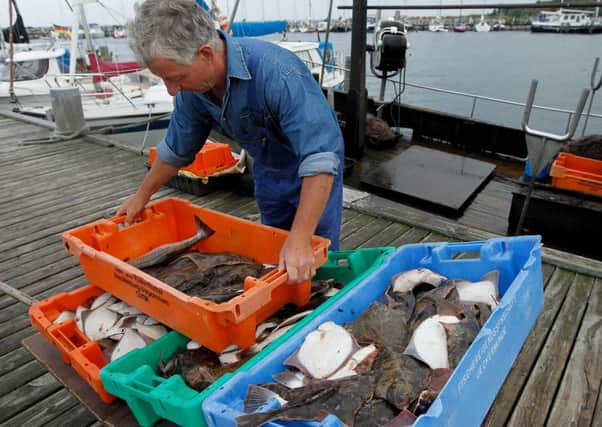Comment: Time to push the boat out and prosper


It is never safe to make firm predictions, even at the beginning of a new year. But 2015 might just be a good one for the Scottish fishing industry.
The opportunities are certainly present in a way that they have not been for many years.
Advertisement
Hide AdAdvertisement
Hide AdAs with all sectors of the economy however – and observers sometimes forget that fishing is, above all, a business – success requires determined risk-takers to literally push the boat out.
In my previous article on these pages last month, I called for the 2014 Fisheries Council to come bearing gifts as the industry prepared for a ban on discarding fish at sea.
While the fisheries ministers and bureaucrats weren’t hugely generous, the outcome was reasonably positive for the men who go to sea in often treacherous conditions to put the most nutritious food known to humankind on our dinner tables and in the fish and chip shops.
Total allowable catches (TACs) in the North Sea for cod, haddock, plaice and monkfish have been increased, while there is to be no further reduction in the number of days vessels can put to sea.
The Scottish Government has estimated that this deal will result in an additional £10 million of earnings for the whitefish and prawn fleets, which represents a rise of five per cent on 2014.
Under a separate agreement, access has been granted to Faroese waters for specified amounts of cod, haddock, saithe, blue ling, ling and flatfish.
These quota increases reflect the health of the stocks, which in Scottish waters at least are fished at or below maximum sustainable yield (MSY) levels – jargon for sustainably. That is down to the hard work put in by an industry wholly committed to ensuring that there is enough fish left in the sea for the next trip and the one after that and so on, ten, 20, 30 years and more down the line.
As fishing industry representatives, politicians and civil servants gathered in Brussels for the December Council, media outlets around the world were reporting on one of the biggest economic stories in recent years – the falling oil price.
Advertisement
Hide AdAdvertisement
Hide AdOn the day the deal was reached – 16 December – Brent crude was trading for just over $61 per barrel, down from more than $110 per barrel four months previously.
At the time of writing it is less than $55 per barrel.
Lower oil prices bring two benefits to the fishing industry.
The single biggest cost of operating a fishing vessel is the fuel required to get to the fishing grounds and back. The current reduction in the price of fuel is helping to reduce these costs and increase profitability in a big way.
Secondly, the greatest concentration of fishing effort in the United Kingdom is in the north-east of Scotland, which also happens to be where the oil industry in this country is predominantly based.
As oil companies retrench, delaying investment plans and cutting production until the oil price climbs higher once again, wages come down and a potential pool of labour becomes available, meaning the fishing industry which is having better times just up the road becomes an attractive option once again.
The transition is made all the easier by the fact that training facilities and funding are available for people wishing to return to the sector or enter it for the first time.
Of course, there are caveats to all this. We are talking about one year when obviously we would rather be talking about the longer term.
But unless substantial changes are accepted by European bureaucrats to the way they envisage the discard ban operating for white fish and nephrops when it is introduced on 1 January next year, then a successful 2015 will be succeeded by a challenging 2016.
Advertisement
Hide AdAdvertisement
Hide AdThankfully, there are some very positive signs here, with the Scottish Government stating openly that it will work to convince the UK and other member states around the North Sea basin that we must have a workable ban that promotes and protects fishing businesses, including a phased approach for the sake of long-term prosperity in the seafood sector.
The European Commission needs to respond with its own positive contribution to get us away from the failed management systems of the past and set us truly on the road to a sustainable and prosperous future.
• Mike Park is chief executive of the Scottish White Fish Producers’ Association.